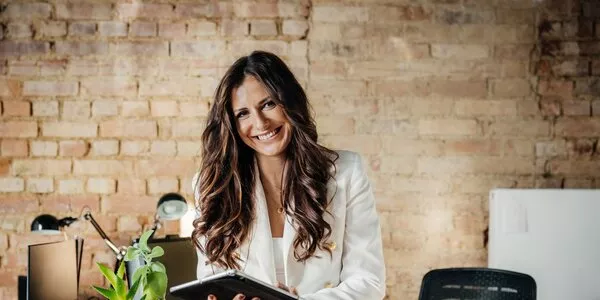
Female Founders: In Conversation with Tamara Gillan
Entrepreneur. Champion of women. Change agent. In conversation with Tamara Gillan, Founder and CEO of Cherry London - a marketing and brand relationship building agency, and co-Founder of the WealthiHer Network.
What was your journey to founding Cherry London?
I was born in England but grew up in New Zealand where I spent much of my later childhood until returning to the UK aged 24. My parents have always had a number of businesses, which gave me the belief and the drive I needed to do my own thing.
I was hell-bent on having my first company by 30, and in the years leading up to the turn of my third decade, I set myself the challenge of working both in marketing agencies and client side to gain as much experience as possible. This was during the height of the digital boom, when I learned how to pick myself up as everything collapsed and the ‘dot-com’ bubble burst…
Turning 30 was a seminal, ‘now or never’ moment: It was time to start on my own. With great support from past clients and mentors, I set-up marketing and brand relationship building agency, Cherry London, in 2009.
Founding a business during a recession was challenging for obvious reasons, however, I strongly believe that during times of economic downturn, opportunities are there for the taking – you’ve got to seize your difference and innovate. We studied the marketing agency landscape and identified that brand partnerships was a niche area, and we wanted, and needed, to be more than just a marketing agency. It didn’t take long for Cherry London to grow from a 2-man band, to a buzzing office of 40 creative minds!
I learned many lessons along the way, and some of which are as important now as they were then – lessons around how innovation can see us through, and also how collaboration and partnership can propel us forward.
Your advice to female entrepreneurs?
I chaired a WealthiHer Network panel event for female entrepreneurs earlier this year, in conversation with the hugely inspirational Anya Hindmarch, CBE, who spoke about how she grew a globally renowned luxury brand. She shared some truly valuable advice, which I totally stand by: you are better than you think you are, so trust yourself and your vision - the truth is that you probably know best…
So, in that vein - Believe that you can do it. Hold the line.
Don’t be scared about hiring people better than you. This is so important to me and a lesson from my business coach. She said: “Hire people who terrify you. That way, you will get the best of the best.”
You can start your business at any age or life stage. You are never too old or too young – just start and believe in yourself. My father started his latest business at 65.
Coaching & Mentoring: This is so important, not only for your staff, but also for yourself. Focus on educating yourself and your team on enjoying the good times, but also preparing for and managing hardships. It can be a very lonely journey in which some really tough decisions have to be made. Don’t be afraid to ask for help and seek guidance.
Find the balance. Running a business is relentless – as my mother said to me: “There will always be a list. You have to sometimes stop, detach and come back to it later.” At the beginning of my entrepreneurial journey, I had extreme workaholic tendencies. But this doesn’t make for a more effective person, leader, or supporter of the team. The lines between life and business have never been more blurred. And you will burn-out if you do not carve out the much important time for yourself.
To be a great leader, don’t expect to be good at everything. Instead, play to your strengths and surround yourself with people who can cover your weaknesses.
3 in 4 women in the UK cannot name a successful female entrepreneur. How important is representation? What more needs to be done to showcase female entrepreneurs as role models?
This is a really sad statistic. Yes, there are more male entrepreneurs in the UK, but more women than ever before are starting, growing and scaling up businesses.
Companies that employ diverse teams far outperform those that lack this diversity. There is a real need to make women’s stories more visible and to offer alternative role models to those ever-present in popular culture.
One of the reasons we are lacking in this space is because women don’t promote themselves in the same way as men - they just don’t back themselves. We have also noted that male-dominated companies are still not making a concerted effort to raise the profiles of their female talent.
Women are also more stretched than ever before – combining the pressures of running, leading and driving a business, as well as facing expectations to manage family and the home. The current pandemic has made this even more clear. Women just don’t have the capacity to do that self-promotion.
I think that it’s crucial that we create platforms to celebrate female entrepreneurs – and this very much sits at the heart of The WealthiHer Network’s mission: to showcase inspirational women and share their expertise and learnings with the next generation of entrepreneurs.
What was your motivation for founding The WealthiHer Network?
I have always been a champion of female empowerment and advancement. I believe in the economic might of women and have such a strong belief that the finance industry needs to be better for women.
I had a vision to create a truly forward-thinking initiative that brought together firms across the industry – working together across competitors in a way that has never been done before – to celebrate, support and educate female clients.
It was a huge vision and we have been so lucky with the support we have received, especially from partners such as Kleinwort Hambros, who made this into a reality. Gabrielle Branson, Deputy CEO, together with her expert team, have worked hard to adapt their service and offering.
Collaboratively, we are working to ensure women get the opportunities that they never have had before.
Transforming the insights from the WealthiHer 2019 report into tangible action points to affect both structural change within the financial services industry and societal change more widely is no mean feat! Please tell us more about the WealthiHer International Women’s Day Pledges.
It is indeed no mean feat! As the founder of a marketing consultancy, I have a lot of experience working within the research space – this forms the building blocks of our work. Of course, research is powerful and informative, but if you don’t use those findings and learnings to adapt existing approaches, inform new direction and take action - it’s redundant.
As a Network, we established a change agenda, for ourselves and for each partner firm - and this is where the pledges originated. 60% of wealth will be in the hands of women by 2025. This shows that women are indeed a mighty economic force, yet 70% of these women don’t feel like they are listened to or understood by the industry.1
There is hope, but the numbers are still not good enough. Over a lifetime, the average woman will lose £1 million from a lack of investing... British female entrepreneurs currently receive 1% of VC funding.2 And how will that look after COVID-19 ?
These facts and figures have informed our mission and pledge - to educate and engage one million women, addressing challenges head on to give women the tools they need to excel.
Your 5 tips for being an agent for change?
1) Get behind something you believe in – you can move mountains and create new possibilities.
2) Don’t go it alone – find someone who inspires you and who isn’t afraid to tell you when you are wrong.
3) Fuel change through the power of collaboration.
4) Define what success looks like for you – measure performance against it and adapt what you do as you go.
5) Enjoy the journey and celebrate in your successes. If you’re doing it solely for money, then it’s probably not going to work.
[1] Source: WealthiHer Report – Understanding the Diversity of Women’s Wealth, 2019.
[2] Source: British Business Bank, UK & VC Female Founders Report, 2017.
CA180/JUL/2020




